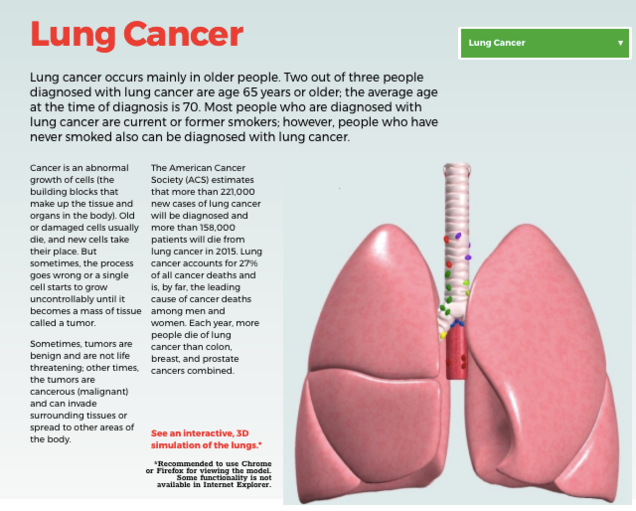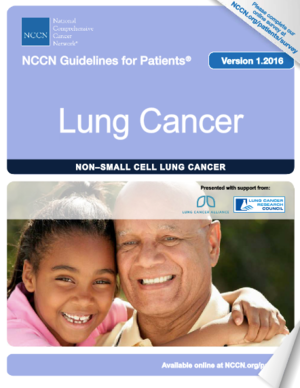- Adult Heart DiseaseDiseases of the arteries, valves, and aorta, as well as cardiac rhythm disturbances
- Pediatric and Congenital Heart DiseaseHeart abnormalities that are present at birth in children, as well as in adults
- Lung, Esophageal, and Other Chest DiseasesDiseases of the lung, esophagus, and chest wall
- ProceduresCommon surgical procedures of the heart, lungs, and esophagus
- Before, During, and After SurgeryHow to prepare for and recover from your surgery
October 30, 2017

Finding out about a new diagnosis of lung cancer can be very overwhelming. You and your family may have lots of questions as you await an appointment with a lung cancer specialist. It’s likely that you are eager to learn as much as possible, as you contemplate the questions that you have for your treatment team.
Fortunately, there are volumes of information available online to help educate you on lung cancer treatment options, as well as to help you learn what it’s like to undergo therapy for lung cancer and what to expect during and after treatment of lung cancer. However, much like other material found online, it is important to be able to distinguish accurate information from not-so-accurate material. Moreover, you may want to have a few go-to sites for when questions arise during your care.
Whether you are looking for images to help you understand what’s going on inside your body, seeking statistics regarding outcomes for your stage of disease, or trying to find an online support group to meet other people coping with the same issues, there are innumerable resources available. In this post, we will try to identify some key sites for your use.
Whatever you review online, be sure to identify the source of information prior to assuming that it is correct. Official medical societies of clinicians who specialize in the care of lung cancer patients can be particularly helpful. For example, The Society of Thoracic Surgeons provides The Patient Guide to Heart, Lung, and Esophageal Surgery, a website presented by cardiothoracic surgeons committed to improving patient care. This site includes a specific section on Lung Cancer, with detailed information regarding types of lung cancer, causes and symptoms, diagnosis and treatment options, as well as details about recovery. You can rely on the accuracy of this information, as it is provided and regularly reviewed by experts in lung cancer treatment. In addition to the facts found in the online Patient Guide, there is also a Blog section, featuring a number of topics that may be of interest to lung cancer patients: Minimally Invasive Surgery, Robotic Surgery, Women’s Lung Health, Choosing a Cardiothoracic Surgeon, Differences in Lung Cancer Between Men and Women, Lung Cancer Prevention, and Lung Cancer Screening.

The National Comprehensive Cancer Network (NCCN) is an excellent source for guidelines explaining staging of lung cancer as well as the typical recommended plan of care for each stage of the disease. One of the helpful aspects of the NCCN site is that it provides guidelines for physicians as well as for patients, tailoring the language and the explanations for the intended user of each resource. The NCCN Lung Cancer Guidelines for Patients is a thorough, online book, covering lung cancer basics, how we go about assessing abnormalities in the lungs, staging of lung cancer, treatment planning, and treatment guides. Also included is a glossary to help you understand common words that might be used in the course of your lung cancer care. This is an outstanding and thorough resource for patients.

There are plenty of other online venues for you to find information, depending on the level of involvement that you seek:
- The LUNGevity Foundation offers a Lung Cancer Support Community, which includes forums and access to an extensive message board with lung cancer information and notices regarding lung cancer events and advocacy opportunities.
- The American Lung Association has a free online lung cancer community called Lung Cancer Survivors for individuals who are living with lung diseases, as well as for their caregivers. This is an online lung cancer forum dedicated to giving members a place to discuss how lung disease is affecting them and to share their life experiences with their peers.
- The Free To Breathe organization offers a support line (with email access), an online community, and the opportunity to get matched with a lung cancer survivor or caregiver. It also has individual support and support groups, and all of these outstanding opportunities are detailed on the Patient and Caregiver Support site.
- Team Draft is an initiative of the Chris Draft Family Foundation, with the goal of changing the face of lung cancer. This initiative focuses on awareness, early detection, treatment, research, and survivorship. On this site, you can read lung cancer stories, including those of survivors as well as of caregivers. You also can learn about a number of other programs hosted by the organization.
If you are looking to get involved at a greater level online, there are also many social media outlets for patients and their families. You can search Facebook for groups (both open and private) of lung cancer survivors. It’s possible to join these groups and interact with their members. Another option is to follow any of the above listed organizations on Facebook, Twitter, or Instagram. If you are eager to get involved in online Tweet Chats featuring key stakeholders in lung cancer care (patients, caregivers, a variety of types of doctors, advocacy groups, researchers, and others), you might want to check out the Lung Cancer Social Media site. This group holds live chats on Twitter every other week, featuring important topics that are relevant to all who care about lung cancer. For those who are Twitter savvy and interested in following lung cancer (and other cardiothoracic) surgeons online, they can also check out the Thoracic Surgery Social Media Network.

Regardless of what type of information and level of involvement that you seek, there are a number of great online resources to help you find everything you are looking for about lung cancer.
The opinions expressed in this article are those of the author and do not necessarily reflect the views of The Society of Thoracic Surgeons.

